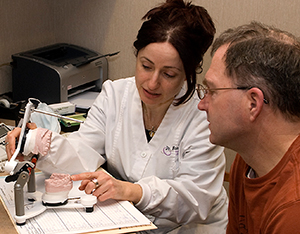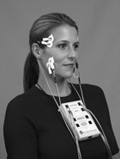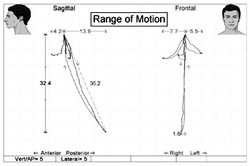Enjoy speaking, chewing, and laughing with total confidence.
Your smile is a significant part of your life. For teeth that are worn, missing, or in need of repair, Dr. Barbat offers the latest techniques to restore your smile to optimal esthetics and function. Together, you can determine the best way to achieve your specific needs and desires.
- Dental Implants
- Crown & Bridge Combinations
- Full Mouth Rehabilitation
- Treatment of Gum Disease & Gum Recontouring
- Precision-Fitted Partials / Dentures
Dental Implants… (click here to learn more)
Dr. Barbat provides all phases of tooth replacement, including Dental Implants. Implants enable you to chew comfortably and speak confidently. They also halt bone loss that occurs when tooth roots are missing in the jaw. This bone loss contributes to changes in facial shape, such as deep wrinkling around the mouth and a pointed chin, which creates a ‘granny look.’
Some options include…
Traditional Dental Implants
An implant is a tooth root replacement held by your jawbone just as a natural tooth. The implant portion is made of titanium, a biologically compatible material.

Implants come in various shapes to fit specific needs. Once the implants are stabilized by the jaw bone, replacement teeth are attached to restore the stability of natural teeth.
“All On 4” Dental Implants
This Dental Implant system is an excellent option for adults with a limited amount of bone or limited budget. All-On-4 Implants are a non-removable option designed to maximize the use of available bone using just 4 implants that are uniquely angled.
After the implants are placed, a new or existing denture is attached as a temporary set of teeth. This means that patients leave with teeth in place … ready to smile, laugh, and eat. Typically, in 3-4 months the implants are fully secured in the bone and temporary teeth are replaced with natural-looking, final teeth that are permanently attached.
Crowns-&-Bridges…
A fixed bridge is held by teeth on both sides of the area where a natural tooth or teeth are missing. After adjacent teeth are prepared for crowns, a ‘bridge’ (a replacement tooth or teeth) is affixed to the crowns, restoring appearance and chewing ability. In some instances, the bordering teeth can serve as anchors for a bridge without crowns. Instead, the replacement tooth or bridge is held by adjacent teeth with the help of metal brackets. With the brackets attached to the back of natural teeth, they are typically not visible.
Dentures/Partials…
A Partial Denture fills spaces of missing teeth to give chewing ability and halt shifting of remaining teeth. Partial dentures usually consist of replacement teeth attached to gum-colored bases, connected by metal framework. Removable partial dentures attach to natural teeth with metal clasps or devices called precision attachments, which are not visible and more esthetic than clasps.
A Full Denture is typically removable and replaces all teeth as well as gums that have diminished in height. New denture wearers need time to get accustomed to their new “teeth” because even the best fitting denture can feel awkward at first. Some have difficulty eating for several days or weeks and may notice a slight change in facial appearance, increased salivary flow, or minor speech difficulty.
TMJ Treatment… (click here to learn more)
The TMJ (temporomandibular joint) is the right and left joint that connects your jaw to your skull. TMJ disorders are a family of problems related to your jaw joint. If you have had symptoms like pain or a “clicking” sound, you’ll be glad to know that these problems are more easily diagnosed and treated than they were in the past, thanks to advanced training and diagnostic technology featured in Dr. Barbat’s office.

Do You Have a TMJ Disorder?
- Are you aware of grinding or clenching your teeth?
- Do you wake up with sore, stiff muscles around your jaws?
- Do you have frequent headaches or neck aches?
- Does the pain get worse when you clench your teeth?
- Does stress make your clenching and pain worse?
- Does your jaw click, pop, grate, catch, or lock when you open your mouth?
- Is it difficult or painful to open your mouth, eat or yawn?
- Have you ever injured your neck, head or jaws?
- Do you have teeth that no longer touch when you bite?
- Is it hard to use your front teeth to bite or tear food?
- Are your teeth sensitive, loose, broken or worn?
Dr. Barbat uses non-surgical treatment options to improve the harmony and function of your jaw. Once an evaluation confirms the TMJ is the true source of your problem, she will discuss the best course of treatment with you.

Sleep Apnea Therapy… (click here to learn more)
If you suffer with Sleep Apnea, you have a problem too dangerous to ignore. While Sleep Apnea leaves you exhausted during the day and a potential threat behind the wheel, it can also lead to serious health problems like high blood pressure, cardiovascular disease and stroke.
There are effective, comfortable options to remedy Sleep Apnea. Dr. Ban Barbat offers several oral devices to help keep airways open. These are custom-tailored to your mouth for optimal comfort and effectiveness.
Dr. Barbat begins by examining you to determine factors that are contributing to your apnea, such as the size and shape of your jaw and tongue and whether you grind your teeth or have a condition like TMJ disorder. With this information, she can recommend a device that is best for your needs.
By treating the upper airway through non-surgical procedures, most adults experience successful results. More complex procedures, however, may be required. Before treatment begins, Dr. Barbat will explain each option and answer your questions.



